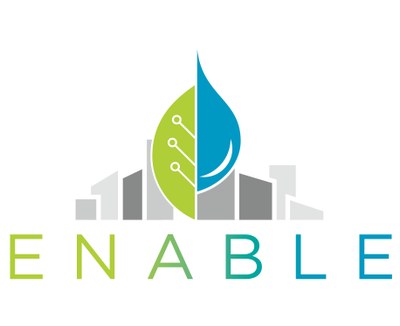Enabling Green and Blue Infrastructure Potential in Complex Social-ecological Regions (ENABLE)

Background
A network of strategically designed and functionally connected green (land) and blue (water) areas and features – also known as 'green and blue infrastructure' - holds the potential to enhance ecosystem resilience and ensure the continued provisioning of ecosystem services and goods to the benefit of human well-being and biodiversity alike. The EU Strategy on Green Infrastructure promotes investments in green infrastructure and the development of a Trans-European Network for Green Infrastructure in Europe (TEN-G) to further develop, preserve and enhance GBI as a tool to address pressing environmental and societal challenges. While many studies provide case-based evidence of the benefits of GBI, the full extent of its multifunctional potential is not yet established in research, policy and planning processes. Furthermore, the majority of studies consider GBI design and management as technical interventions and often insufficiently consider the cultural-social dimensions of socio-ecological systems. Such research is necessary to understand the full range of potential benefits of GBI as well as to ensure their delivery via a more collaborative and optimized design and implementation.

Main objectives
The overarching aim of ENABLE is to advance the state of knowledge surrounding GBI in order to implement GBI-solutions and unlock their full potential. An analytical and practice-relevant evaluation framework is to be developed using a transdisciplinary systems approach. New instruments and concepts for evaluating potential efficiency and multifunctional characteristics of GBI in urban areas will be key components in the process. Specifically, the project will:
- Identify the fundamental relationships between GBI, biodiversity and ecosystem services in urbanised regions,
- Improve the understanding of human perceptions and cultural values of GBI and biodiversity,
- Investigate barriers hindering equal access to GBI benefits, and
- Examine critical success factors to improve the analysis, design, management, conservation, performance and assessment of multiple benefits of GBI.
The results will inform the participatory co-design and co-production of local-specific GBI. To this purpose, five case study areas (Halle, Barcelona, Lodz, Stockholm and Oslo) will be explored, and New York City will be included in the project as an external node for benchmarking. Therewith ENABLE contributes to secure a sustainable and resilient future for humans and biodiversity in dynamic human-dominated landscapes across Europe for nature and society.

Case study map (Source: Imre Sebestyén jr / UNITgraphics).
Structure and tasks
- Project coordination and support of other work packages.
- Coordination of the internal research process through an integrative analytical framework, which enables an in-depth exchange between project concepts and empirical knowledge from the case studies.
- Communication and outreach as well as organisation of participative processes for the transfer and use of project findings in policy and practice, and the initiation of learning processes on the local, national and EU scale
Four work packages are dedicated towards the following analytical and research orientated tasks:
- Determination of the case study context and local political concepts, which includes comparative system descriptions of case studies and a common database.
- Research of socio-cultural perception and preferences of GBI, in order to gain comprehensive insights on the benefits and (non-monetary) costs of GBI.
- Analysis of access to benefits of GBI as well as possible barriers and requirements for GBI in reference to different population groups.
- Evaluation of the resilient supply of ecosystem services by means of GBI, their role for biodiversity and their possible impairments through land use change.
Ecologic Institute in ENABLE
Within the transdisciplinary research framework, Ecologic Institute will lead the work on assessing socio-cultural perceptions and preferences of citizens as well as the valuation of different GBI options. Ecologic together with NINA will develop methodological guidance and support the five case study areas in conducting e.g. structured interviews, group-based deliberative valuation, Q methodology, online surveys and multi-criteria decision analysis. The assessments will have a specific focus on supporting services of GBI as habitat for biodiversity in urban areas. In addition, Ecologic will support the policy and institutional analysis in the case study sites and the formulation of policy options.
Sandra Naumann
Tel: +49 30 86880-0
sandra.naumann@ecologic.eu
Ecologic Institut gemeinnützige GmbH,
Pfalzburger Str. 43/44, D-10717 Berlin
Humboldt University of Berlin (HUB) in ENABLE
As specialist for land use modelling and quantification of ecosystem services, HUB takes lead in the work package dedicated towards the determination of case study context. The objective is to develop a comprehensive database for the case study descriptions and a conceptual framework for context dependency and transferability of research results. Additionally, local governance structures and policy concepts for establishing GBI will be researched in order to define options for better policies, decision-making and planning of GBI. HUB will also contribute towards the analysis of the resilient supply of ecosystem services from GBI in order to analyse the effects of the provision of multiple benefits of GBI.
Contact:
Prof. Dr. Dagmar Haase
Tel.: +49 30 2093-9445
dagmar.haase@geo.hu-berlin.de
Tel.: +49 30 2093-6843
manuel.wolff@geo.hu-berlin.de
Humboldt-Universität zu Berlin,
Mathematisch-Naturwissenschaftliche Fakultät II,
Geographisches Institut, Landschaftsökologie,
Rudower Chaussee 16, D-12489 Berlin
Project partners
- Stockholm University, Sweden
- Humboldt-Universität zu Berlin (HU Berlin), Germany
- Universitat Autònoma de Barcelona (UAB), Spain
- Norwegian Institute for Nature Research (NINA), Norway
- Polish Academy of Sciences, European Regional Centre for Ecohydrology (ERCE), Poland
- University of Lodz, Poland
- Ecologic Institut, Germany
- Dutch Research Institute for Transitions (DRIFT), Holland
- International Union for Conservation of Nature (IUCN)
- Local Governments for Sustainability (ICLEI)
- The New School, USA
Funding and project duration
Project duration: February 2017 - January 2020
